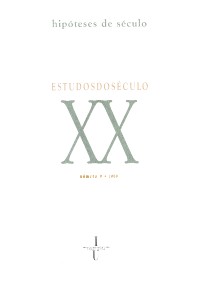Please use this identifier to cite or link to this item:
https://hdl.handle.net/10316.2/36542| Title: | Cabral do Nascimento tradutor: um intelectual entre a «vilazinha pobre» e a «biblioteca» do mundo | Other Titles: | Cabral do Nascimento, translator: an intellectual between the «poor small village» and the world «library» Cabral do Nascimento traducteur: un intellectuel entre la «petite ville pauvre» et la «bibliotheque» du monde |
Authors: | Rodrigues, Ana Salgueiro | Keywords: | Cabral do Nascimento;Translation;Cultural Planning;Library;Estado Novo;Cabral do Nascimento;Traduction;Planification de la Culture;Bibliotheque;Estado Novo | Issue Date: | 2009 | Publisher: | Imprensa da Universidade de Coimbra | Abstract: | Cabral do Nascimento foi um
dos mais fecundos tradutores
do século XX, ocupando-se
da versão, para o sistema
cultural português, de mais
de cem autores de diversas
proveniências, justamente
num período da nossa História
descrito como um tempo de
isolamento relativamente ao
estrangeiro. Partindo da análise
do corpus tradutório deixado
pelo intelectual madeirense e
do conceito de tradução como meio de planificação de cultura
(Even-Zohar), procuraremos
sublinhar a importância da
tradução (e especialmente
da tradus:ao de Nascimento)
enquanto fen6meno de contrapoder
empenhado em abrir os
horizontes de um Portugal, que
o regime salazarista pretendia
estar/ser «orgulhosamente so». Cabral do Nascimento a été l'un des plus féconds traducteurs du XXème siècle, s'occupant de la version, vers le système culturel portugais, de plus de cent auteurs de différentes provenances, précisément à une periode de notre Histoire décrite comme un temps d'isolement par rapport à l'étranger. Partant de l' analyse du corpus traduit laissé par l'intellecruel de Madère et du concept de traduction en tant que moyen de planification de la culture (Even-Zohar), nous chercherons à mettre en exergue l'mportance de la traduction (notamment la traduction de Nascimento) comme phénomène de contre-pouvoir qui misait sur l'ouverture des horizons d'un Portugal, que le régime salazariste prétendait être/exister «orgueilleusement seul». Cabral do Nascimento was one of the most fecund translators of the 20th century, since he translated into the Portuguese cultural system over one hundred authors worldwide, precisely at a time in our History when Portugal was isolated from the rest of the world. Focusing on the legacy of translations of this intellectual from Madeira and on the concept of translation as a means of planning culture (Even-Zohar), we will seek to highlight the importance of translation (particularly the translation by Nascimento) and a phenomenon of counterpower committed to opening the horizons of a Portugal that the regime of Salazar undertook to being «proudly alone». |
URI: | https://hdl.handle.net/10316.2/36542 | ISSN: | 1645-3530 1647-8622 (digital) |
DOI: | 10.14195/1647-8622_9_10 |
| Appears in Collections: | Revista Estudos do Século XX |
Files in This Item:
| File | Description | Size | Format | |
|---|---|---|---|---|
| cabral_do_nascimento_tradutor.pdf | 5.88 MB | Adobe PDF |  |
Items in DSpace are protected by copyright, with all rights reserved, unless otherwise indicated.
